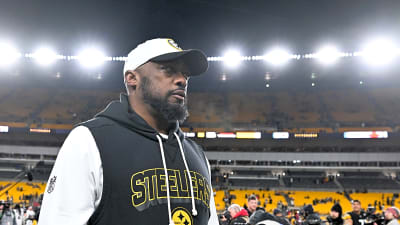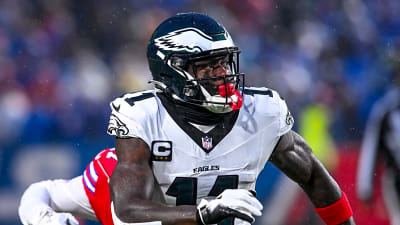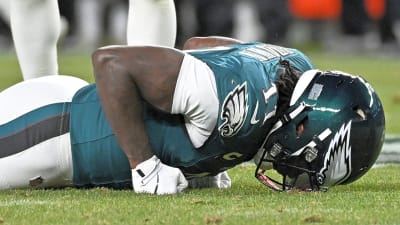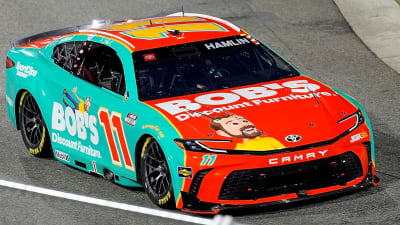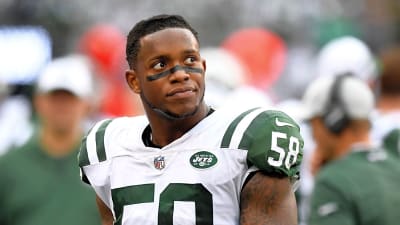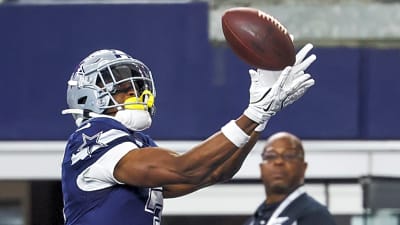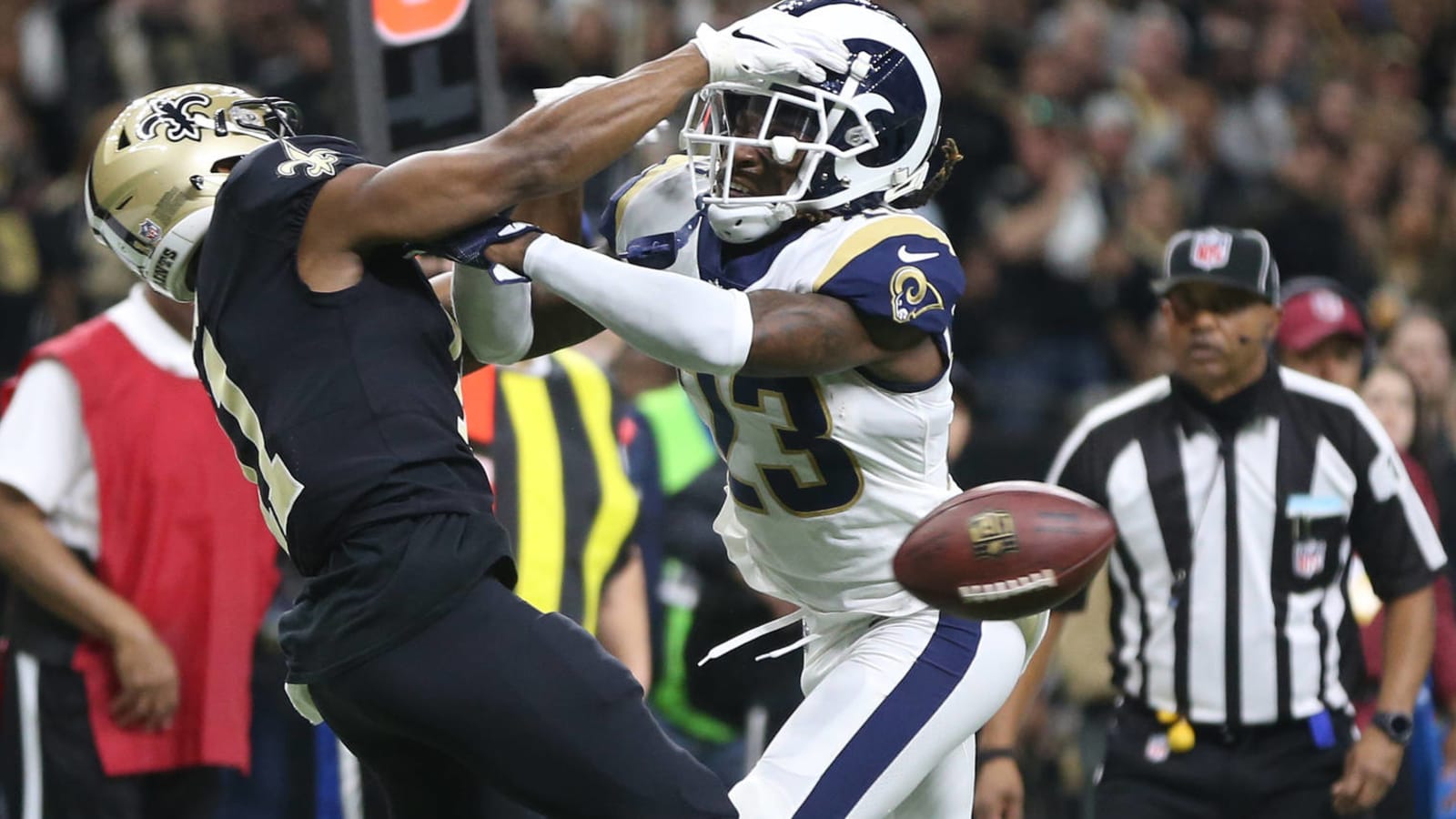
How to clean up NFL pass interference mess
[Editor's note: This article was originally posted on 9/20/19.] Yardbarker NFL writers Michael Tunison and Chris Mueller address some of the hottest issues in the league. This week's topic: What should be done about the state of pass interference penalties in the NFL?
Mueller: If you, like me, are a masochist and enjoy participating in Twitter during nationally televised football games, you probably saw several angry tweets directed at Sean Payton and Saints fans during the Falcons-Eagles Sunday night tilt. At first, I did a double-take, and couldn’t figure why people would be taking Payton to task, and then I looked back at the television to see that a pass interference play was being challenged.
Of course it was.
Atlanta challenged a no-call on a pass intended for Julio Jones, and did so nine minutes into the game, with a 3-0 lead. The play was upheld, but the leverage of the situation was pretty low, all things considered. Fans hated it because it held up the proceedings, I’d imagine.
That was small potatoes compared to what happened in Pittsburgh, where an interference challenge may have altered the outcome of a game. Seattle, facing second and 20 and clinging to a 21-19 lead midway through the fourth quarter, challenged a no-call on a Russell Wilson deep ball intended for Tyler Lockett. The original outcome was overturned, Steelers safety Terrell Edmunds got hit with a 38-yard interference penalty, and the Seahawks scored what would prove to be the winning touchdown three plays later.
The call on Edmunds was far from conclusive, and though Steelers linebacker Bud Dupree should have been hit with a roughing-the- passer call on the same play, bringing “ball don’t lie” into the equation, it felt like a strange way to have a game turn. If the call had been made or not made in the moment, each fan base could have reacted and moved on. Instead, there was a waiting game, endless speculation, multiple replay angles, and finally, the decision. The whole thing felt incongruous.
That said, it’s here to stay. The league took such a beating from Saints fans and the national media after last year’s NFC Championship fiasco that it decided to take action. Instead of the much smoother, more natural Sky Judge solution, one implemented by the short-lived Alliance of American Football, the NFL went with a ham-handed expansion of the challenge system to include interference. Fans are already rebelling against it, and will probably come to hate it. It will decide games and make very few people happy, but it won’t go away.
No one liked the new roughing-the-passer rules, and they notably cost the Packers a win last year, and guess what? They’re still here, and they’re still causing problems. Bradley Chubb’s incredibly weak personal foul against Bears QB Mitch Trubisky turned an almost-certain Denver win into a loss. The league won’t budge on that. It's reactive instead of proactive, clumsy in its response, and unable to apply common sense to any situation. Don’t blame Sean Payton and the Saints (who got rooked again by a bad call on Sunday, by the way). Blame the NFL. As usual, this is its problem.

Tunison: I agree there's limited use in blaming the Saints and Payton, as they precipitated something that was bound to happen anyway. In exchange for taking years to finally settle on a definition of a catch that has proved satisfactory to everything, the NFL had to make a dozen other routine aspects of the game unwieldy and frustrating. And the trend toward making everything reviewable is sadly an inexorable force across all sports.
But the need to overanalyze pass interference is connected to an easier fix: making pass interference a 15-yard penalty. There are still problems with reviewing pass interference altogether, as it requires officials to rewatch plays in slow motion and try to judge whether any amount of contact violates a vague standard that surely changes from person to person.
With pass interference, when viewing plays in super-slow speed, any amount of touching looks significant. A fan or a coach sees a hand brush on a receiver's shoulder and suddenly they want a fresh set of downs when it's debatable whether that actually impedes anyone. But there would be less incentive for teams to try these Hail Mary challenges on PI if the reward for being successful weren't so high. Fifteen yards and a first down are nothing to sniff at, but that's small potatoes compared to the heave it down the field and potentially set yourself up for a score approach that teams bank on from time to time.
The one weakness to the 15-yard penalty for pass interference standard is it creates incentive for DBs to commit pass interference automatically if they get beat deep. I think this is where replay can be useful. There could be a loophole in the rule saying that if the foul is blatant beyond 15 yards, it remains a spot-of-the-foul penalty. To be clear, there needs to be exact language about what constitutes blatant pass interference, like a defender grabbing or throwing their body into a receiver. Replay could be used in the event that that gets overlooked.

Mueller: The problem with the loophole would be that, somehow, it would get dragged into slippery slope territory, and then we'd be arguing the definition of "blatant," or "egregious," or some similar word. Other than that, I think making PI a 15-yard penalty is long overdue. I'm actually a fan of an offense-dominated version of the sport, but the cleanest way to satisfy purists-- i.e. make games lower scoring -- is to make PI less punitive.
Offenses would have to string longer drives together, defenses would have at least a somewhat easier time of it, and the league would be able to serve both masters without compromising on any of its player safety rules. The penalty on Terrell Edmunds was a classic example of any contact looking like interference, by the way. Edmunds definitely had his hands on Tyler Lockett, who was spinning to make an adjustment to the ball, but in slow motion, it looked like Edmunds was doing most of the turning for Lockett.
Did it really impede his ability to make the catch? Take two or three looks at it in slo-mo, and you'd probably talk yourself into saying yes.
The Week 2 Green Bay-Minnesota game provided an example of a pass interference review that I loved and want to see more of. The Vikings had a touchdown come off the board because of a "pick" play that initially went uncalled. The Patriots have turned that particular play into an art form, and if properly executed (that is to say, on the blurred line of legality), it is nearly impossible to stop.
Defensive players are being ever more restricted in what they can do to receivers, but the pick plays continue largely unabated. Start officiating that play stridently, and reviewing it quickly and decisively, and you'd have a positive step for the league that would take away a "gimmicky" play that usually doesn't seem legal.
Oh, and in broad terms, you'll never convince me that the NFL isn't deliberately vague about these rules. It keeps them in the headlines all the time, and the league knows that lawsuits from angry fans will never amount to anything. As long as the relative integrity of the product isn't compromised, a little controversy is good for business.
Tunison: I get the potential headaches of trying to define obvious pass interference on long pass attempts, but I think it does hold some merit because fans love home run plays. Given that many of them have already been legislated out of kick returns, and most offenses are based on short passes and screens nowadays, you really risk making football too much of a plodding affair by taking away long bombs. Because with PI penalties set at 15 yards, unless a receiver is completely uncovered and open by 10 yards, every cornerback and safety is going to be coached to commit a foul if a receiver beats them.
As you said, the NFL loves them some controversy, and this lets everybody win. You get the occasional borderline call that lets the hot take industrial complex do its thing, and the sport doesn't become confined to a 20-yard window of the field.
I'm with you on removing pick plays from the passing game, mostly because aesthetically they're just ugly as well. It's usually a way of freeing up a slot receiver in the five-yard dump pass range on a third and short or in the red zone. You know it's coming on almost any given Patriots third down, and it makes watching them all the more frustrating because once again there's the element of bending the rules, but it's not even in a way that's fun to watch.
What's more, I can't think of a rule change that has clearly helped pass defense since the NFL got rid of the force-out rule for completions. Unfortunately, as you noted, the NFL is reactive and seldom forward-thinking, so it will require the perfect set of bad circumstances, like a Super Bowl being decidedly on a ticky-tacky arbitrary pass interference review for changes like this to be implemented. The thing is, it's hardly outside the realm of possibility.
More must-reads:
- Yardbarker's Week 3 NFL picks, game previews
- Top storylines for NFL Week 3
- The 'Super Bowl winning coaches' quiz
Breaking News
Trending News
Customize Your Newsletter
 +
+
Get the latest news and rumors, customized to your favorite sports and teams. Emailed daily. Always free!
